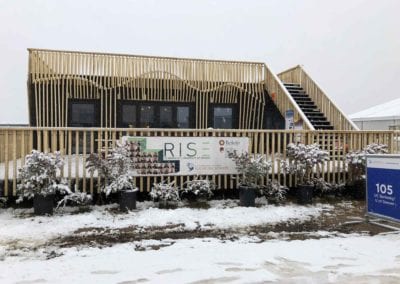Can Elon Musk single-handedly destroy the utility industry?
You’ve probably heard about Elon Musk’s offer to power Puerto Rico. (Just in case, the Twitter conversation is pasted in below.) The fascinating question this brings up for me is this: what does it mean for the utility industry?


For the last few years, I’ve been warning utility executives that in a world where any of us can track a pizza delivery on our phones, it’s no longer acceptable for a utility to not know when the power’s going to come back on after an outage. Other industries have changed consumer expectations across the board – we simply won’t wait for anything anymore because we don’t have to.
Up until now, the response I’ve received to that warning has been one of uncomfortable agreement … but also a bit of a shoulder shrug. Nobody has ever said this to me, but I’ve had the feeling that the industry has felt a bit safe … yes, they know they need to do better, be faster, be more attuned to customers, but, their reasoning has seemed to be, “Still, it’s not like there’s really an alternative for the vast majority of people … they can want us to be more like Amazon or Google all day long, but it is what it is and they’re stuck with us, like it or not.”
Until now, I think.
Whether or not Musk pulls off the Puerto Rico offer is kind of beside the point. What’s happening is that he’s reinforcing the idea – for all of us – that there could be another way to get your power. Maybe we don’t need the 100-year-old utility model anymore, we’ll start to think. Maybe we don’t need to be stuck with an old-school, uncommunicative, slow-moving utility, and unempathetic customer service reps. Maybe there’s a better way.
If consumers really start thinking this way, I can see two things happening. First thing: they could begin to demand change of their public utility commissions. The letters and calls will go something like, “Look, if Elon Musk can get Puerto Rico back online from nothing, and do it with clean energy, why aren’t we doing that here in our community? Why are we continuing to do things the old way when there’s a new, better way?” I can also see that other entrepreneurs will get in on the action. It won’t just be Musk. Other bright folks will create companies with better options for how we can all acquire power and upend the current model – the equivalents of Uber, Airbnb and Netflix, if you will.
I may have met some of those disruptors this week.
I had the honor of being on the jury for the SD Communications contest, one of 10 competitions that make up the DOE Solar Decathlon (or in, this case, the Snowlar Decathlon, since it was 32 degrees and snowing HARD in Denver while we were doing our house walk-throughs). Eleven college teams each built a sustainable house – houses that are powered by solar and batteries (like the Tesla Powerwall), houses that collect and use grey water, houses loaded with smart technologies to optimize the user experience while lowering environmental impact.
Despite the cold temperature and grey skies, most of the houses were fully functioning and cozy warm. I was told by the event organizers that many people who’ve participated in Solar Decathlon teams in the past have gone on to start their own businesses. Maybe this year, after seeing that they can indeed build a beautiful, low-impact home that works just as well when it’s sunny and warm as it does when it’s grey and cold, they’ll go start companies that challenge the current utility business model. Maybe they’ll start businesses that challenge the current home building model.
Maybe their experience, happening smack in the middle of the worst hurricane season ever, alongside a social media conversation about a better way to power a community, is indeed the perfect storm that disrupts the utility industry.





I believe when the top automobile producers start planning to switch entirely to electric cars, that the tipping point has been reached. Oh, that happened last week!